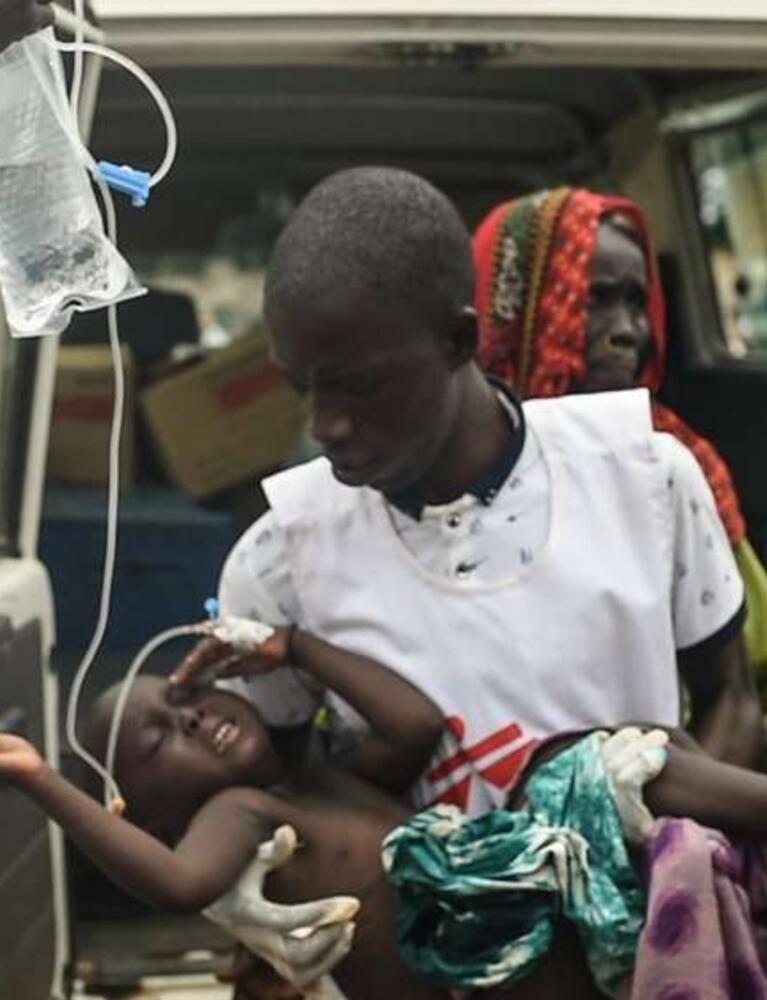The town of Bama is on the frontline in the conflict between the Nigerian army and Boko Haram.
In August, a Médecins Sans Frontières/Doctors Without Borders (MSF) team went to the town, which is 75 kilometres away from Maiduguri – Borno State’s capital.
MSF project coordinator Hakim Khaldi describes how emergency assistance was delivered to people living in a camp.
MSF’s emergency operation in Bama
"A commercial hub on the road to Cameroon, Bama used to be rich but it’s a ghost town now. Several months ago, its inhabitants fled and took refuge in Maiduguri because of the conflict between Boko Haram and the Nigerian army. Boko Haram fighters aren’t far off, just a few kilometres from Bama.
All you see in Bama these days are displaced people who’ve been forced out of nearby villages. They’re living in a camp under military control, the Nigerian army has a base in the town. It’s estimated there are 15,000 displaced people in the camp, mostly women and children under the age of five.
They live in makeshift shelters made out of iron sheeting taken from houses. These people can’t provide for themselves, so they’re totally dependent on outside help for food.
We went back to Bama on 17 August for an emergency operation. The aim was to reduce morbidity and mortality in children under five by providing them with enough treatment and food for one month, so we brought in therapeutic food for malnourished children (PlumpyNut®) as well as food rations (beans, oil and BP5: fortified biscuits).
"For security reasons we travel by helicopter"
During our operation, which lasted four days, we stayed overnight in town outside the camp. There was a curfew from six o’clock in the evening to seven o’clock in the morning and no electricity in the house the army lent us.
On the first day, we began work at 7 in the morning. The queue of people waiting was so long we couldn’t see the end. There were huge lines of women and children. We screened and treated children suffering from malnutrition and distributed food to families with children under five.
We’re planning to go back to Bama twice over the next two months to provide treatment and distribute one month’s worth of rations again. But this kind of operation isn’t easy to manage. It can’t be done without coordinating with the Nigerian army. And, we’re not free to move around as we want.
For security reasons, we – the team – have to travel by helicopter from Maiduguri to Bama, and an army escort is required to accompany trucks transporting food and drugs.
Malnutrition, malaria and skin infections
Malnutrition is the biggest medical issue we’ve encountered. During our operation, we examined a total of 3,293 children under five and treated 513 for malnutrition. In other words, 15.1 percent of children were suffering from malnutrition, and 4.2 percent of these from severe acute malnutrition.
Despite appearances, that’s a slight improvement on our previous visit on 13 July when we distributed therapeutic food. We saw an alarming situation and a rate of severe acute malnutrition of 15 percent was recorded.
As for the other issues, the three main pathologies we observed during medical consultations were malaria, skin infections and diarrhoea. The number of malaria-carrying mosquitos is increasing now the rainy season has started.
There’s a clinic run by the Ministry of Health and UNICEF in Bama but very few patients go because it doesn’t have enough drugs. And, a couple of weeks ago, the Nigerian air force opened a small hospital at the entrance to the camp. But people aren’t rushing there either
Request to vaccinate
We distributed bed nets to prevent the risk of malaria. But the problem of shelter is nowhere near being resolved. Most families live in shelters put together with rusty iron sheeting and the rain leaks inside.
Some have got plastic tarpaulins and tents now, but as they don’t have windows, they’re horribly hot. During our operation, we saw around 40 women and children arrive. They couldn’t find any shelters in the camp so they had to set up on mats on the bare earth.
In view of these exceedingly precarious living conditions, MSF has submitted a request to Borno State’s health authorities to vaccinate the camp’s inhabitants against measles, pneumonia and cholera. The consequences can be fatal when one of these diseases comes on top of malnutrition.
Access to water is another of the camp’s problems. Only seven of nine wells actually work so there’s not enough water to go round. Several organisations are providing assistance to the displaced in Bama, but this assistance is still patchy and not enough to cover everything that’s needed."






